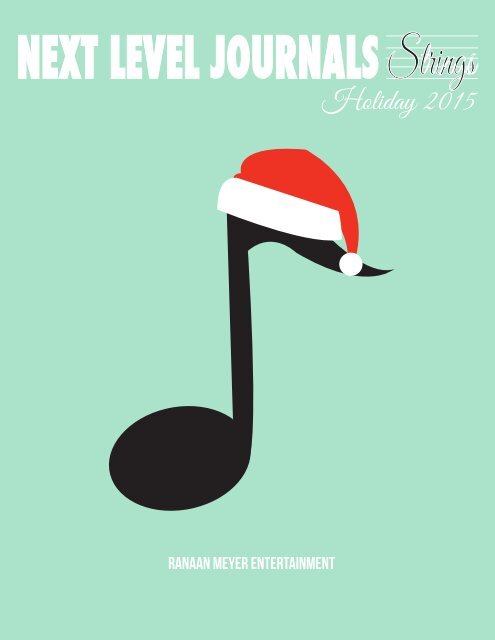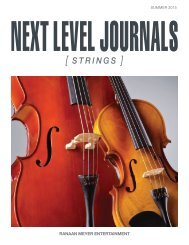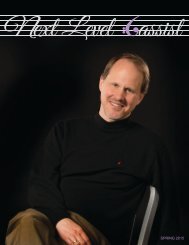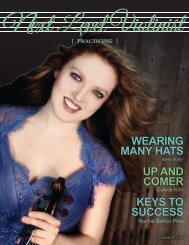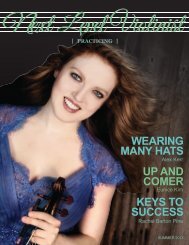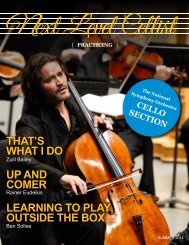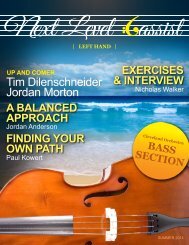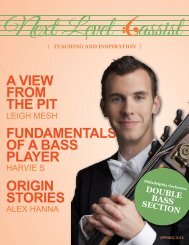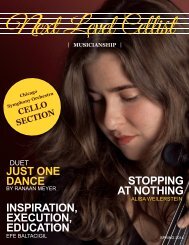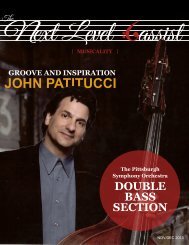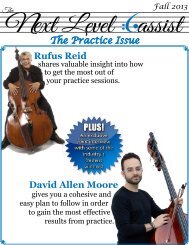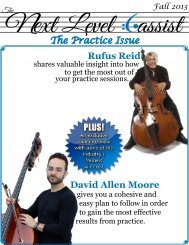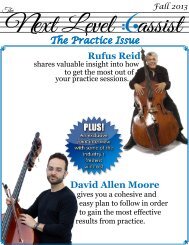You also want an ePaper? Increase the reach of your titles
YUMPU automatically turns print PDFs into web optimized ePapers that Google loves.
NEXT LEVEL JOURNALS Strings<br />
<strong>Holiday</strong> <strong>2015</strong><br />
RANAAN MEYER ENTERTAINMENT
CONTENTS<br />
The road to<br />
performing<br />
nikki chooi<br />
violin<br />
principal bass<br />
houston symphony<br />
Robin kesselman<br />
double bass<br />
remember, your teachers<br />
are trying to help you<br />
dan foster<br />
viola<br />
CONTRIBUTORS<br />
be nice and kick butt<br />
yumi kendall<br />
cello<br />
RANAAN MEYER<br />
publisher/founder<br />
Joanne Erwin<br />
Norma Meyer<br />
emily meyer<br />
co-editors<br />
Emily meyer<br />
art work
The Road to Performing<br />
Nikki Chooi
THE JOURNEY<br />
I was born in Victoria, British Columbia<br />
to parents of Chinese descent. My musical<br />
journey began at age 4 with the Suzuki<br />
Method and at age 9, I studied with<br />
Sydney Humphreys, one of the most influential<br />
figures in my life, at the Victoria<br />
Conservatory of Music. My parents were<br />
and are still the strongest source of support<br />
of my musical growth and education,<br />
from giving the loudest applause to being<br />
the “number one fans” of my brother (also<br />
a violinist) and me. To this day, they still<br />
travel to attend my concerts whenever<br />
they can. When I was 14 years old, I participated<br />
in the Starling-DeLay Symposium<br />
for Violin Studies held at the Juilliard<br />
School in New York City. Observing and<br />
playing for respected violinists such as<br />
Itzhak Perlman, Anne Akiko Meyers, and<br />
Paul Kantor, I was completely enamored<br />
by the whole experience. It was then that I<br />
decided I wanted to pursue a career in music.<br />
When I told my parents that I wanted<br />
to stay in New York and learn from these<br />
masters, my parents were reluctant to let<br />
me pursue a music career. They were adamant<br />
in having me finish a well-rounded<br />
education in Canada.<br />
As a compromise, I attended the Mount<br />
Royal University Academy Programme in<br />
Calgary along with the Morningside Music<br />
Bridge Summer Programme also held<br />
in Calgary, while attending high school in<br />
Victoria. I travelled to Calgary from Victoria<br />
about once a month to receive violin<br />
lessons from Bill van der Sloot, as well as<br />
participating in the Academy Programme<br />
which included activities, collaborations,<br />
and masterclasses from respected artists<br />
such as James Ehnes, Andres Cardenes,<br />
Lynn Harrell, and many others.<br />
The first time I heard about the Curtis Institute<br />
of Music was when fellow Canadian,<br />
Julliete Kang won the Indianapolis Violin<br />
Competition, which followed a short profile<br />
of her that was shown all over Canadian<br />
television in the mid 1990s, just when I
had started the violin. I remember a clip<br />
of her playing “Flight of the Bumblebee”, a<br />
video tour of the wooden interior of Curtis,<br />
and a peek into student life there. I was<br />
extremely fortunate to be accepted into<br />
the school to study with both Ida Kavafian<br />
and the late Joseph Silverstein.<br />
usually held in the Zimbalist room and was<br />
a nerve-wracking experience. I felt that if<br />
I could be satisfied with a performance in<br />
studio class, I could perform anywhere.<br />
My first chamber music experience at<br />
Curtis was studying the Beethoven Harp<br />
Quartet with respected cellist, Peter Wiley.<br />
He was an extraordinary inspiration to me<br />
back then and even today, I am still influenced<br />
by his experience and mentorship.<br />
Masters Studies:<br />
I was never disciplined with doing scales,<br />
arpeggios, and etudes but during my studies<br />
at Juilliard, I made it a priority to<br />
include it into my practice regime. The<br />
reason for this was to enhance my consistency.<br />
My Practice Routine as a Student:<br />
1. 45 minutes on warm ups, scales,<br />
and arpeggios<br />
2. 30 minutes on Paganini Caprices<br />
When I was preparing for competitions,<br />
performing in Ms. Kavafian’s studio class<br />
was the most rigorous training - playing<br />
in front of my peers who were studying<br />
and working on the same repertoire and<br />
also in such close proximity. The class was<br />
And over 3 days, I would rotate these categories<br />
of repertoire:<br />
1. Bach Sonata or Partita<br />
2. Classical Sonata<br />
3. Romantic Sonata<br />
4. Classical Concerto<br />
5. Romantic Concerto<br />
6. Contemporary Work<br />
7. Virtuosic Work<br />
SOLO COMPETITIONS<br />
My first few years of participating in competitions<br />
were a great learning experience,<br />
however, I never advanced past the semifinals<br />
round. As I applied greater discipline
and consistency to my daily practice and<br />
an organized preparation my performances<br />
steadily improved. The first time I<br />
advanced to the finals in an international<br />
competition was at the 2012 Queen Elisabeth<br />
Competition in Brussels. Since then, I<br />
have advanced to the finals in every event<br />
I participated in, eventually winning first<br />
prize at the 2013 Michael Hill International<br />
Violin Competition in New Zealand. Winning<br />
the Michael Hill gave me numerous<br />
opportunities to perform concertos and<br />
recitals.<br />
TIME FOR THREE<br />
I heard about Time for Three during my<br />
first year at Curtis - through the grapevine.<br />
In 2009, I was in a Foundations of<br />
Engagement class and Time for Three<br />
came in to talk about their experience. I<br />
heard TF3 live in 2011 at Music from Angel<br />
Fire and I was completely blown away.<br />
I still remember wondering what I could<br />
take from watching them live and putting<br />
it into my own performances.<br />
Two summers ago, I received a call from<br />
Nick to invite me to sub for Zach DePue<br />
for a one week long Time for Three engagement.<br />
Without a thought, I said, “Of<br />
course!” I came into rehearsals really not<br />
knowing what to expect however, it felt<br />
very natural and inspiring to play with<br />
Nick and Ranaan for the first time. I had<br />
never played in this unique formation,<br />
nor had I ever improvised or played other<br />
genres besides the classical repertoire.<br />
The more we played together, the more<br />
confident I became and I was able to just<br />
be myself.<br />
We were able to play 6 educational concerts,<br />
some promotional and donor events,<br />
and 3 evening concerts all in one week.<br />
Each event felt better than the last and<br />
I really believed that we were creating a<br />
new kind of energy together. That week
with Time for Three was one of the highlights<br />
of my year.<br />
A few months later, I met up with Nick<br />
and Ranaan because they asked me to<br />
have lunch with them and talk about some<br />
things and then I remember it was Ranaan<br />
who asked me to the join the trio. It was<br />
the last thing I thought I would hear and I<br />
was thrilled beyond belief.<br />
way about my playing. By trying my best<br />
and giving it my all I am in the greatest<br />
position to succeed.<br />
So I had a decision to make and after careful<br />
thought, I accepted their offer because<br />
I love collaborating and the collaboration<br />
process. Time for Three is all about the<br />
giving and taking of musicianship and<br />
artistry at the highest level of music making.<br />
This is engaging and the fundamental<br />
performance aspect of tf3 is really the<br />
reason I play music.<br />
I remember my father even told me when<br />
I had the opportunity to sub with TF3 that<br />
I should practice really hard because you<br />
never know, maybe someday, I would have<br />
the opportunity to join the group. I laughed<br />
at him – but as it turns out, he was right!<br />
It was a great life lesson.<br />
I strive everyday to embrace a philosophy<br />
of understanding that there is only so<br />
much one can control. So I try my very<br />
best in everything. This satisfies my own<br />
standards and makes me happy with myself.<br />
If I can be happy with my own progress<br />
over time others will feel the same
Be N<br />
Kick<br />
Bu
tt and<br />
ice<br />
Yumi Kendall
Inspiration day to day<br />
My professional life is as a performer and educator.<br />
I have been the Assistant Principal Cellist<br />
for the Philadelphia Orchestra since 2004, and<br />
it’s been a BLAST! The collaborative chamber<br />
music that happens on stage is extraordinary. In<br />
addition, I also have a private teaching studio;<br />
I’m constantly learning through teaching, and I<br />
appreciate the challenge of seeing through students’<br />
eyes and experience – doing so keeps me<br />
on my toes. I am also a mentor for the Community<br />
Artists Program (CAP) at the Curtis Institute<br />
of Music.<br />
My newest responsibility<br />
I have recently initiated The Suzuki Alumni<br />
Project. The Suzuki movement does not yet have<br />
a central database or community for its alumni,<br />
and I’m hoping to remedy that, with the participation<br />
of the many thousands of Suzuki “kids”<br />
who are enthusiastic about their Suzuki foundations.<br />
I’m a Suzuki Kid - AND PROUD!<br />
It’s mind blowing to observe how many musicians<br />
consider themselves Suzuki Alumni and<br />
to see what they are up to in many professional<br />
spheres. The unharnessed talent that is out<br />
there –Suzuki alum as professional orchestra<br />
musicians, chamber musicians, and soloists- is<br />
the inspiration behind this network. Colleges,<br />
Youth Orchestras, and Festivals are very aware<br />
of who their alumni are, and I see a similar, untapped<br />
opportunity in the Suzuki world, as well<br />
as a desire in Suzuki Alumni to show their pride<br />
of their educational roots.<br />
As a teenager I was academically interested in<br />
EVERYTHING. I actually didn’t decide until my<br />
senior year to go into music. I worked hard,<br />
practiced cello intensely, and had many green<br />
lights, musically speaking, but the conscious decision<br />
to audition for music schools did not happen<br />
until the fall of my senior year. I attended<br />
Waldorf Schools from kindergarten through high<br />
school graduation- an enormous influence-, and<br />
I remember keenly that each of my high school<br />
subject teachers felt I should enter his/her academic<br />
field. I love learning, and upon reflection,<br />
it was the combination of my Suzuki and Waldorf<br />
education that has given me my current identity<br />
as a forever student- never stop growing! Also,<br />
though, I did have a practical fear of being in an<br />
accident after which cello wouldn’t be an option<br />
(knock on wood), and that fear combined with<br />
positive school experiences encouraged my ideal<br />
to be well rounded. However, as a senior in high<br />
school, I would have had no way of knowing that<br />
five years later I would be at the front of the<br />
Philadelphia Orchestra cello section, counting my<br />
lucky stars!<br />
A few things that knocked my socks off<br />
In my first season in the Philadelphia Orchestra,<br />
February 2005, Wolfgang Sawallisch conducted<br />
Beethoven’s Violin Concerto with Leonidas<br />
Kavakos and I pretty much knew it couldn’t get<br />
better than this- as close as ever to what the<br />
music should be. I also have fond memories of<br />
being in school at Curtis, subbing with the Philadelphia<br />
Orchestra playing Brahms 2 with Simon<br />
Rattle conducting; during the same week playing<br />
in school with the Curtis Orchestra, Sir Simon<br />
came to do a reading and when he saw me in orchestra<br />
he said “wow, some people just show up<br />
everywhere!” I recognized in both circumstances<br />
that I was starting to experience music in a way<br />
that was extraordinarily special and to have<br />
experiences that I would never forget.<br />
I have also loved performing for Live Connections<br />
at World Café. These performances, called<br />
Bridge Sessions, focus on connecting one culture<br />
to another culture, one time period to another,<br />
one genre to another. For a student who may
not have had any opportunity to explore music<br />
through varying entry points, a Bridge Session<br />
is an incredible and exciting adventure. We - a<br />
trio of mixed instruments- play in an intimate<br />
space, often for young children who have likely<br />
never seen a musical instrument before, up close<br />
and personal. To me, this is what it is all about:<br />
inspiring a child so that he or she can light his<br />
or her own spark.<br />
Repertoire that was pivotal to my musical<br />
growth<br />
In 7 th grade, my cello teacher David Hardy, principal<br />
cellist of the National Symphony Orchestra<br />
in Washington, DC, gave me the first cello part of<br />
Pierre Boulez’s Messagesquisse for 7 cellos. Over<br />
the year he had me memorize the entire piece,<br />
note by note, line by line, and, eventually, page<br />
by page (which consists of three solid pages of<br />
random 16th notes, followed by two solid pages<br />
of triplets, also random), played at a brisk metronome<br />
marking of 132 for the quarter note. At<br />
the time, I didn’t quite recognize what he set out<br />
for me to accomplish, but what he taught me in<br />
hindsight- and really an unbelievable gift from a<br />
teacher- is the confidence that with patience and<br />
perseverance, I can learn anything.<br />
In contrast, a few years later, while learning<br />
Shostakovich Cello Concerto #1, I struggled with<br />
one passage at the end of the piece- really fast<br />
32 nd notes scales- might any cellists out there<br />
sympathize? -because my fingers would move<br />
neither quickly enough nor correctly, and I was<br />
SO frustrated that I actually cried in a practice<br />
session. Another important lesson from that<br />
frustration was to understand that the struggle<br />
of challenge, and overcoming that, is part of<br />
learning and the growing process.<br />
Studying with Yumi<br />
Currently, I have a full private teaching studio.<br />
In recent summers I have taught at the National<br />
Orchestral Institute at University of Maryland,<br />
which I enjoy very much- these are curious and<br />
hard-working cellists who are on the edge of<br />
their formal studies, and about to embark on a<br />
professional journey: a pivotal time, and it’s a<br />
blast to work with them. In addition, coordinated<br />
with the Philadelphia Orchestra’s annual summer<br />
residency in Saratoga Springs, NY, I teach<br />
at the New York School of Orchestral Studies<br />
held at Skidmore College. Both of these opportunities<br />
afford me, the teacher/coach, to imbue the<br />
students with individual attention, yes, but also<br />
a camaraderie that is unique to being in a section,<br />
and a cello section, at that!<br />
I believe that the single most important role of<br />
a teacher is to believe in her student. And, when<br />
ready –and different ages and apparent skill sets<br />
provide the entry point of my work- a student<br />
who asks questions- of me, of the composer, of<br />
the music- will eventually come into one’s own<br />
as an artist. Beyond having belief in a student,<br />
learning to ask questions- and to follow the questions-<br />
that’s the fuel of life.<br />
My secret to success is “Kick Butt and Be Nice”<br />
Being excellent and being kind is a recipe for<br />
success.<br />
Excellence through the quality of one’s work<br />
Kindness to connect that excellence, and that<br />
work, with other people<br />
Conviction, compassion, and communication<br />
For if we are alone on an island, just playing<br />
for ourselves, what’s the point? It’s the human<br />
connection, the human communication, and the<br />
human sharing- that is the reason behind it all.<br />
And through music, we connect to each other.
Robin Kesselman<br />
Newly Appointed Principal Bass
I am 8 months into the job as of December <strong>2015</strong>.<br />
While I am starting to feel settled into the new<br />
position, I still feel incredibly lucky and grateful<br />
for the opportunity to play with this orchestra.<br />
My colleagues could not be more welcoming. One<br />
of the biggest (and best) transitions is that all<br />
the music that I am prepping on a daily basis is<br />
going to be performed. As a student I remember<br />
this was not the case – the scales were weighted<br />
to preparation for auditions or lessons. Now it’s<br />
only about serving the music. How do I hear<br />
a particular phrase in this piece? Or what did<br />
Schumann mean with a Sforzando here, instead<br />
of an accent? It’s not about what an audition<br />
committee may want, or how my presentation<br />
comes across to other people judging me.<br />
Nowadays, the turn-around time for preparing a<br />
piece of music is fast. There isn’t time for a piece<br />
to get stale or over-worked. There’s been a natural<br />
progression for me of playing a lot of new<br />
material with a lot of different musicians.<br />
As a student, I didn’t always trust my decisions<br />
so I needed more time to make my choices.<br />
That’s ok, that’s why we go to school. We have<br />
mentors and more experienced colleagues to lean<br />
on. When I began subbing with great orchestras<br />
like the Philadelphia Orchestra and the Los Angeles<br />
Philharmonic, and playing chamber music<br />
with players I looked up to and respected, I got<br />
more exposure and new ideas. I started to develop<br />
more confidence in my choices. This is crucial<br />
in the professional world. Continuing forward,<br />
playing in Houston I don’t have to look very hard<br />
to be inspired. My colleagues provide daily models<br />
of musicianship and artistry.<br />
As I was making the transition to the professional<br />
world, I started thinking about all the parts of<br />
my playing I still saw problems with. I felt like I<br />
was about to make this switch, but personally, I<br />
still wasn’t where I wanted to be technically and<br />
musically. I remember asking my teacher at the<br />
Curtis Institute of Music, Hal Robinson, “Please<br />
tell me you were better when you were 30 years<br />
old than when you were 25?”<br />
Thankfully Hal replied, “Man, I was better when<br />
I was 30 and I was better when I was 40 and<br />
even better when I was 50.”<br />
“Thank goodness!” I breathed a sigh of relief that<br />
I still had more time to keep improving.<br />
How I came to the Bass<br />
I grew up outside of Chicago. My parents are<br />
choral musicians and my sister is a singer so<br />
music is kind of like a family disease. I constantly<br />
heard people singing. Music was always<br />
around but I didn’t want to sing. My quiet rebellion<br />
was being an instrumentalist. I began in<br />
the public schools in the 4 th grade. Our strings<br />
teacher, Mrs. Wegscheid, came into my class and<br />
showed me all sorts of instruments and I chose<br />
the bass.<br />
Virginia Dixon was my first bass teacher. She<br />
is an extremely talented teacher and I started<br />
working with her in the 6 th grade and continued<br />
all throughout high school. Charlie Nilles, a bass<br />
player, grew up just 2 blocks away from me,<br />
also studied with Virginia, and now he is in the<br />
National Symphony. He was always like my bass<br />
older brother growing up. As a young bass student<br />
I would do things like Richard Davis’s bass<br />
weekend and go to the ISB conventions.<br />
I always played sports growing up and wasn’t<br />
initially very serious about the bass. It was<br />
around Freshman or Sophomore year in high<br />
school when I realized I wasn’t going to be a pro<br />
football player so I started to devote myself to<br />
the instrument in a different way. I played in the
Chicago Youth Symphony Orchestra, and I took<br />
some lessons with Rob Kassinger from the Chicago<br />
Symphony. I had transformational summers<br />
at Boston University Tanglewood Institute and<br />
Domaine Forget, up in Quebec, Canada. Domaine<br />
is where I met the teachers I would go on to do<br />
my undergraduate studies with - David Moore<br />
and Paul Ellison. I also studied with Leigh Mesh<br />
of the MET orchestra for one year in college.<br />
When auditioning for schools I was wait-listed at<br />
the schools I wanted to go to and felt like I always<br />
needed to dig deeper.<br />
But what I realized is: work ethic beats natural<br />
talent every time.<br />
I went to Los Angeles to study with David Moore.<br />
First at Colburn and then I followed him to the<br />
University of Southern California. David taught<br />
me how to play the bass. In my mind he is one of<br />
the best teachers anywhere, right now. His analytical<br />
mind meshed with mine and he was able<br />
to give me exactly what I wanted and needed at<br />
the time.<br />
dove into having complete control over my bow<br />
speed. I hoped that by refining my musical building<br />
blocks, when I came back to full strength, I<br />
would be able to think more about the music and<br />
less about how to make the sound. I devoted a<br />
lot of time on just this. Another thing I got into<br />
was practicing excerpts with my right hand only.<br />
I would put a rag in between the strings and the<br />
fingerboard, up by the nut to have the strings<br />
feel and react as if my left hand were fingering<br />
through the passage.<br />
This kind of work in addition to mental and<br />
visualization practice is why I was able to work<br />
up the Curtis audition while I was injured and<br />
only playing 20 - 30 minutes with my left hand.<br />
I think it’s important to realize that you can<br />
practice in some capacity even when one part of<br />
Unfortunately in my final year at USC I suffered<br />
a playing-related injury and couldn’t play fully<br />
for an entire year - December to December. It<br />
was one of the hardest things I have ever had to<br />
work through. Luckily, the injury was only in my<br />
left arm. That let me keep working on right arm<br />
concepts. I was looking for any way I could to<br />
continue improving as a player during the injury.<br />
I kept going to lessons<br />
I took little phrase shapes such as a crescendo<br />
or diminuendo over 3 counts, and practiced<br />
them aiming to get rid of all excess motion and<br />
sounds. I realized that long phrases are these<br />
little musical gestures linked together, so I
you may be tired or injured and that using your<br />
brain and thinking about your practice is also a<br />
crucial part of moving forward.<br />
My professional career kind<br />
of worked out all at once<br />
I won trials for Principal Bass simultaneously<br />
with the Saint Paul Chamber Orchestra and the<br />
Houston Symphony last Fall. Before those auditions<br />
I had a one year sub contract lined up<br />
with Los Angeles Philharmonic starting in January.<br />
The LA Phil bass section has been a huge<br />
influence in my playing. I spent two summers<br />
studying with their Principal, Chris Hanulik, and<br />
continue to think of his playing and artistry on a<br />
weekly basis. Things came together for me all at<br />
the same time and after a lot of smart, efficient<br />
practice.<br />
In the Houston Symphony everything is still<br />
pretty recent and fresh. I am constantly getting<br />
to know people. I now also have the comfort of<br />
knowing that I can make music and put bread<br />
on the table from that career. The closest thing<br />
I ever came to a real job was working as an<br />
umpire for little league in middle school. I have<br />
always supported myself in a way by music. I<br />
hope to be lucky enough to continue feeling like I<br />
haven’t worked a day in my life.<br />
Having music as a career is an amazing life. But<br />
it needs to be said more often that if one loves<br />
music, one can continuing loving music and have<br />
a fulfilling, intimate relationship with music<br />
throughout life without depending on it for a livelihood.<br />
When music is your life, there isn’t ever a<br />
way to clock out of work. You never get to leave<br />
your work at the office over the weekend and a<br />
task is never really completed. There is always<br />
another layer to dig deeper into a piece or a technical<br />
concept. Working on fundamentals such<br />
as pitch, rhythm, and sound is a life-long, never<br />
ending process. You have to come in with eyes<br />
wide open knowing that is part of the equation.<br />
If after knowing all this you’re still into it and it<br />
sounds good, then you’re going to be okay. It is a<br />
serious commitment and a life long journey.<br />
I am not trying to discourage people but it is<br />
really important to know that you do not have to<br />
be a pro musician to have music in your life.<br />
Studying with Hal Robinson and Edgar<br />
Meyer<br />
The first challenge in working with Hal and<br />
Edgar is getting past the fact that you’re in the<br />
same room as them and then appreciating the<br />
experience. I did not take a second of my time<br />
with them for granted. There is never a single<br />
moment that you lose sight with Edgar and Hal<br />
that it is always about the music. It is never<br />
about doing a trick fingering for any reason<br />
other than the musical line. Choices come from<br />
the repertoire.<br />
I went to Aspen and worked with Edgar for two<br />
summers. I was working on a Haydn Divertimento,<br />
which had a slow opening that seems<br />
very simple. I recall spending 30 minutes working<br />
on only this 4 note opening. Edgar would put<br />
so much detail into the nuance of shaping something.<br />
He had the full pallet of a dynamic range<br />
in mind. In a lesson, you will always run out of<br />
time when working on a musical moment with<br />
Edgar. The work is never finished, it’s just that<br />
you have to move on because of time constraints.<br />
As demanding as he and Hal were with instilling<br />
a commitment to shaping with us, we all knew<br />
they are even more demanding on themselves.<br />
This is what was so eye opening. It sort of goes<br />
into the category of light bulb moments that still<br />
pop up or things that will pop up years from now.<br />
Ultimately making decisions to serve the music.
If it sounds good it is good. Finding a fingering to<br />
serve the music IS the fingering worth choosing.<br />
The music is always above the ego<br />
Hal Robinson’s The Quad Volume 2<br />
I can’t believe I got time to spend with those<br />
guys. Seriously, I can’t believe it.<br />
In conclusion the standard or the norm is that<br />
you really don’t know what a particular moment<br />
is like until you are looking back on it, but if you<br />
can get a little glimpse of just how special a moment<br />
can be while you’re experiencing it – that’s<br />
powerful!<br />
The point is to try to maximize as many of those<br />
experiences. And it is so possible while making<br />
music.<br />
available for instant download<br />
www.ranaanmeyer.com<br />
The Colorado College Summer Music Festival is<br />
an intensive three-week program for 50 festival<br />
fellow musicians. All participate in formal and<br />
informal chamber music concerts, orchestra<br />
performances and off-campus outreach programs.<br />
Application Deadline<br />
February 15, 2016<br />
Full scholarships for all accepted students<br />
For more information please contact us at<br />
(719)-389-6552<br />
www.coloradocollege.edu/musicfestival
Wabass Institute 2016<br />
at the Charley Creek Foundation<br />
Wabash, Indiana<br />
June 19-24, 2016<br />
www.wabass.com<br />
Hal Robinson<br />
Eric Larson Ranaan Meyer
Remember, Your Teachers
Are Trying to Help You<br />
Dan Foster
Professional and Student Life<br />
I have been the Principal Violist<br />
of the National Symphony<br />
Orchestra since 1993. It is my<br />
23rd year as a member, and<br />
my 22ndyear as principal.<br />
Additionally I teach both privately<br />
and at the University of<br />
Maryland, and also do a fair<br />
amount of chamber music<br />
playing. In my family everyone<br />
played an instrument.<br />
And before I knew it, I was<br />
playing and learning violin<br />
from my father with the Suzuki<br />
Method. I later became<br />
a student of the renowned<br />
Suzuki pedagogue Ronda<br />
Cole (who ironically is now<br />
the violin teacher of my two<br />
children, and from whom I<br />
therefore am still learning). In<br />
high school I started playing<br />
some viola but I didn’t really<br />
want to because my father<br />
was a violist and I wasn’t really<br />
excited about following<br />
in his footsteps. I soon discovered,<br />
however, that as a violist<br />
I was very much in demand,<br />
and I had some very exciting<br />
and fulfilling experiences<br />
playing chamber music as a<br />
violist at summer camps and<br />
with friends in High School. I<br />
found that at these summer<br />
music festivals I had a lot in<br />
common with my fellow musicians,<br />
and realized that perhaps<br />
I was my most comfortable<br />
with myself in the world<br />
of music. When I got close to<br />
college I started thinking a lot<br />
more about a career in music.<br />
This is when I also started<br />
to make the official switch to<br />
viola.<br />
Because I came to a decision<br />
to pursue a musical career<br />
quite late, I had only applied<br />
to one music school, Oberlin<br />
Conservatory. Ironically, while<br />
I had tried to do everything<br />
different than my family I ended<br />
up doing exactly the same<br />
thing – my brother, both parents,<br />
and both of my mother’s<br />
parents all went to Oberlin.<br />
The viola professor at Oberlin<br />
at the time was Jeffrey Irvine,<br />
about whom I knew nothing<br />
before I came to Oberlin. It<br />
was my good fortune that he
was a tremendous teacher.<br />
He was extremely dedicated<br />
to teaching, and had a knack<br />
of understanding and addressing<br />
each student’s individual<br />
needs. In fact, I came<br />
to realize he had a much better<br />
handle on what I needed<br />
to work on than I did.<br />
After Oberlin I went to Curtis<br />
for two years working with<br />
Karen Tuttle. I had known<br />
about her from a master class<br />
she had given at Oberlin my<br />
freshman or sophomore year,<br />
which I had not much cared<br />
for. My opinion of her evolved<br />
over the next couple of years,<br />
through working with Mr. Irvine,<br />
who had been a student<br />
of Ms. Tuttle’s, as well as<br />
through learning more about<br />
her teaching approach, and<br />
by the time I was a senior at<br />
Oberlin, I had determined<br />
that she was the right teacher<br />
for me for grad school. Sure<br />
enough, she proved to be<br />
the perfect teacher for me at<br />
that stage of my career.<br />
Having had several very<br />
strong but very different<br />
teachers; this taught me a<br />
very important lesson about<br />
being open-minded. My first<br />
instinct was always to reject a<br />
new teacher’s idea that was<br />
opposite of what had been<br />
taught to me by my previous<br />
much-loved teacher. But<br />
I eventually realized if I didn’t<br />
buy into what is being taught<br />
to me, I wouldn’t get anything<br />
out of it, so by deciding to<br />
trust someone and go with it –<br />
it really started to pay off.<br />
Mstislav Rostropovich<br />
Sometime during my years at<br />
Curtis I had the tremendous<br />
opportunity of playing a private<br />
“audition” for the great<br />
cellist Mstislav Rostropovich,<br />
for whom I played the Bartok<br />
Viola Concerto. He listened to<br />
3 other students and me, then<br />
brought us together into his<br />
room for his feedback. When<br />
it was my turn for my critique,<br />
though he had nice things<br />
to say, what I remember the<br />
most is that he said, “Everything<br />
you play is out of tune”.
This was at a point in my career<br />
when I had already won<br />
2 competitions, been close to<br />
winning some big orchestral<br />
principal jobs, and felt that I<br />
was a finished product. Needless<br />
to say, it threw me for a<br />
loop. So I realized I had the<br />
choice:<br />
1) I could just ignore what he<br />
told me<br />
Or<br />
2) See whether, though I had<br />
never heard this comment<br />
from anyone else before,<br />
there was indeed truth to it.<br />
So, I did decide to fully embrace<br />
and examine it. And<br />
I started at square one and<br />
found that he had been right.<br />
It turned out to be a very important<br />
part of advancing my<br />
playing which I came very<br />
close to missing out on.<br />
This was about taking a risk<br />
and enabling myself to get<br />
the most out of learning.<br />
Rostropovich later gave me<br />
my job for the National Symphony.<br />
Trust me it was worth<br />
listening.<br />
The Viola<br />
I am not sure if much has<br />
changed with the evolution of<br />
the viola in the last 20 years.<br />
As a solo instrument it was<br />
already evolving as a voice<br />
before I started playing. Of<br />
course it is a middle voice in-
strument by nature. But there<br />
are so many people that love<br />
the viola as a sound and push<br />
it forward.<br />
People who play the viola<br />
generally have to appreciate<br />
its role bridging the gap between<br />
the other instruments. I<br />
feel it is a great role in order to<br />
being able to listen and hear<br />
how everything goes together.<br />
The Three Standard Classical Career<br />
Choices<br />
I would love to have 3 full<br />
time careers:<br />
1) Orchestra musician – which<br />
I do full time<br />
2) Chamber musician – which<br />
I do part time<br />
3) Viola Teacher – which I do<br />
part time<br />
When I do teach, I love analyzing<br />
what everyone is doing<br />
and figuring out how to<br />
help my students practice at<br />
a higher level. I did not learn<br />
to practice well myself until I<br />
went to college so I like helping<br />
teach how to practice.<br />
My teachers taught me a lot<br />
but I also learned from my<br />
peers. It is important to realize<br />
just how many avenues of<br />
learning there are if you are<br />
always looking for opportunities<br />
to learn.<br />
Advice to up and coming violists<br />
of today:
1) There are many different<br />
possible career paths. Don’t<br />
get tunnel vision about what<br />
constitutes a satisfying career<br />
in music.<br />
For example some people<br />
say, “I want to win a job in<br />
an orchestra.” Do they want<br />
to win a job in an orchestra,<br />
or do they want to play in an<br />
orchestra? Winning a job happens<br />
on one day, playing in<br />
an orchestra can happen as<br />
long as 30, 40, 50 years.<br />
2) Nuts and Bolts: every time<br />
you go to practice make sure<br />
you know exactly what you<br />
are going to work on. Often<br />
people spend a lot of time<br />
practicing and they can not<br />
really be sure what they accomplished<br />
with their time.<br />
Ask yourself questions like:<br />
How can I be efficient?<br />
How much time do I have to<br />
work today?<br />
What specifically can I improve<br />
in that time?<br />
How can I improve it?<br />
What’s my strategy today?<br />
What are my goals today?<br />
3) Recognize styles and experience<br />
life, music theory,<br />
history, things that are not music<br />
studies but will influence<br />
your life. Everything you do<br />
in school will help you to become<br />
a better musician.<br />
Exit Strategy:<br />
My future looks a lot like the<br />
present. I like to know when<br />
I am going to make big<br />
changes. I like to be able to<br />
be clear in my own head to<br />
know when it is not my turn<br />
any more. If I am still principal<br />
violist of the National Symphony<br />
when I am 65 -that will be<br />
more than 40 years occupying<br />
this position. I feel like that<br />
is almost unfair to all the great<br />
violists who deserve a position<br />
like that, and I would like not to<br />
overstay my welcome. So financially<br />
I want to plan for when I<br />
switch gears to something else<br />
in my life.<br />
Hear Me:<br />
If being immersed in music<br />
makes you happy, you will find<br />
success in music. I always loved<br />
to listen to music, study music,<br />
and play music. I didn’t realize<br />
how much until I was close to<br />
college age, but now I realize
that the love of music is what<br />
kept me going in the years be<br />
fore I realized that was how I<br />
felt. On the plus side, I therefore<br />
had a lot of other interests<br />
which keep me balanced to<br />
this day. Music is a labor of love,<br />
not of planning for a life of financial<br />
stability. Occasionally<br />
you can have both, but financial<br />
stability is not a reason to<br />
pursue music. People pursue a<br />
musical career because it’s the<br />
only thing that will make them<br />
truly happy.


